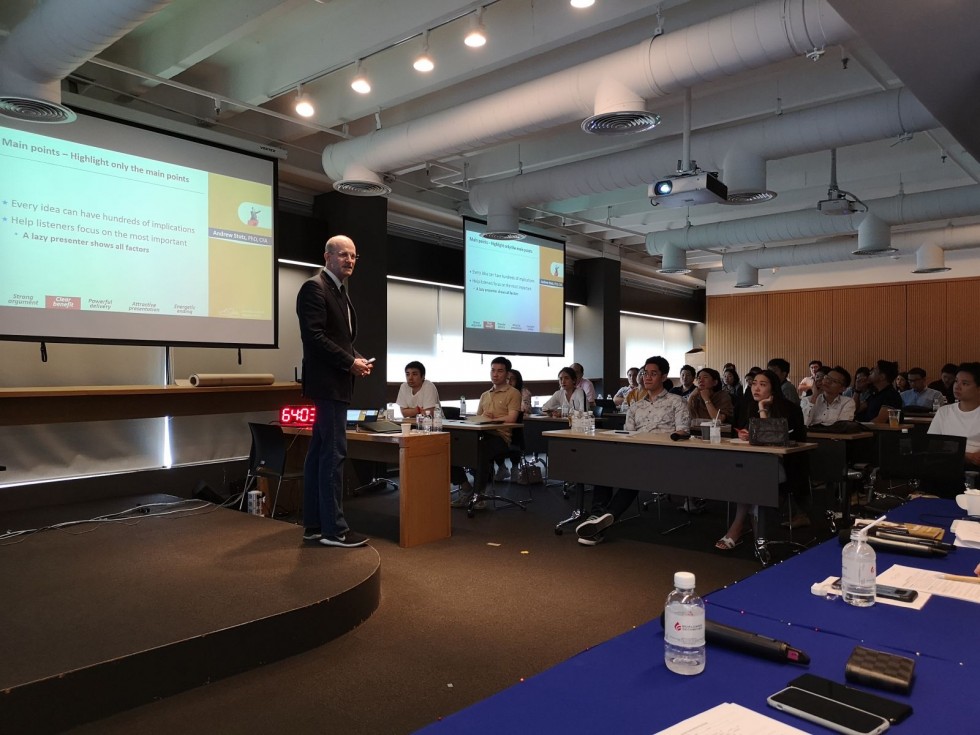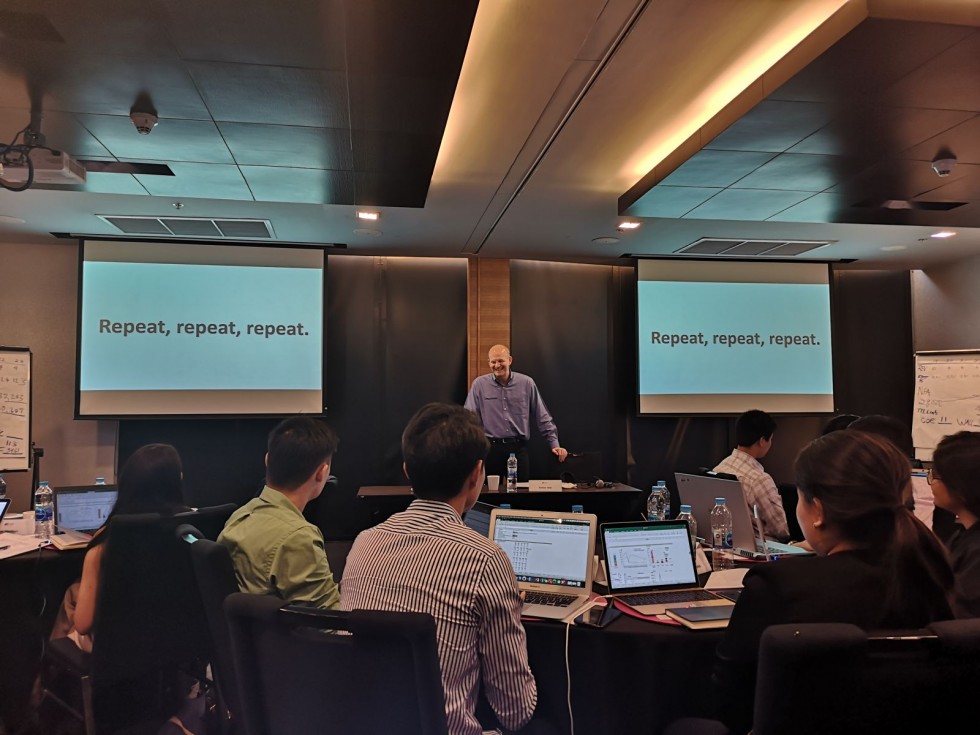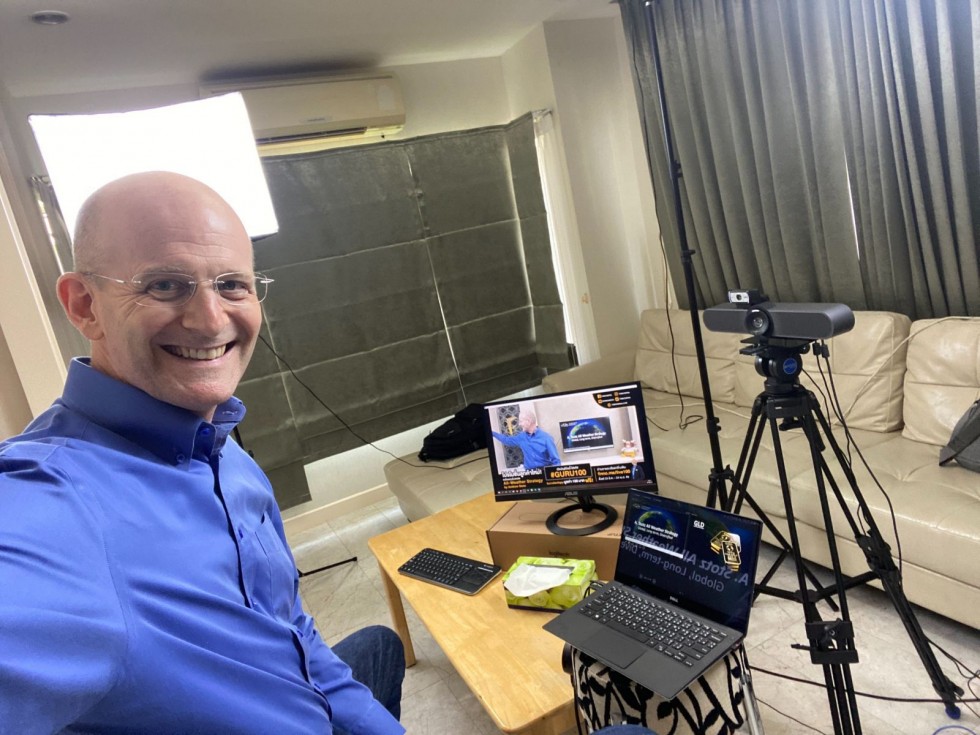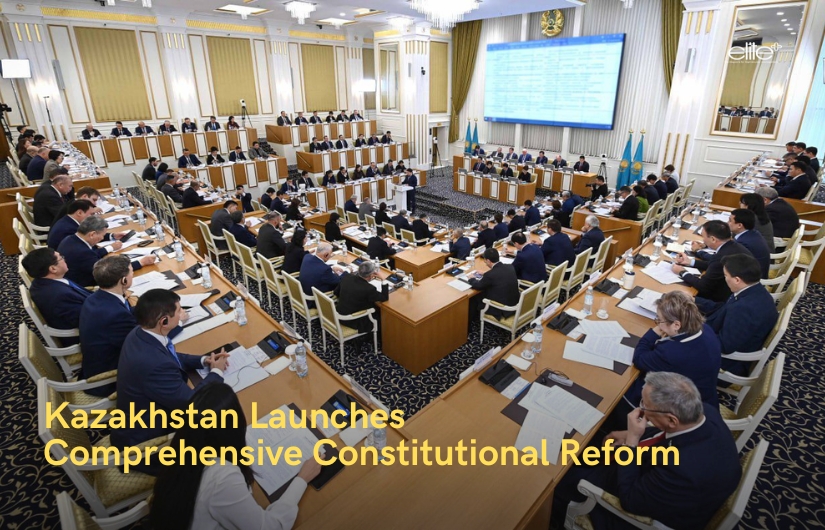Could you give us your perspective of Thailand’s and the world’s current economic conditions as both a business owner and financial analyst?
The Covid-19 problem is obviously very serious, but the actions governments and people are taking could potentially cause economic suicide. I think we have to balance the economic risks.
As a business owner, my business, CoffeeWORKS, is a coffee roasting factory. We're part of the food supply chain. We do not want to shut down our business. We want to serve our customers. In fact, Thailand has a great supply chain that, you know, hopefully can handle this situation.
From an economic perspective, we're talking about serious economic damage. If we look at the US, businesses are shutting down across the country, and the result is that we are probably going to see a 15% to 20% contraction in GDP, which is enormous. In the 1997 crisis in Thailand, when the economy crashed, the Thai economy fell by 11% in 1998. In the Great Depression in America, the US economy fell by 25%, which was a massive fall, and I think that we're headed for that. So, from a business owner’s perspective, I think, first, you've got to try to keep your business alive. We have to try to cut costs as best we can. From an economic perspective, it's going to be a very difficult time, and this could last for another three to six months, but eventually, it will turn around.

With Covid-19 affecting businesses in Thailand and around the world, in which sectors would you advise investors and entrepreneurs to invest their money?
Well, I think that right now people must be very careful about investing in any business. When it comes to the stock market, I would say it is probably the time to hold onto your cash. I think it is best to hold fixed income funds or instruments. Maybe invest in gold, something that is more of a sure thing. I don't think you should move too quickly right now to deploy your cash. So, first, I would say to be patient, but that doesn't mean that there are not opportunities. There are people who have cash right now. In fact, I was just on the phone with a client of mine this morning, who is setting up a restaurant business in Bangkok. He has a very interesting business model, different from others. He has cash, and I know that there are some investors who would be interested in this project. The point is that it's going to take time for the economy to rejuvenate. If someone said, “I really want to invest in the stock market right now.” I would tell them to look at health-care companies, look at companies providing food and basics. Eventually, they can get more speculative when things start to turn around, but I don't think that we're near that turn around yet.
The Stock Market in Thailand (SET), like those all around the world, has suffered massive loses. What advice do you have for investors? Should they sell? Is it a time to buy as the stocks are so low?
I think we have to look at this from two perspectives, for those who already have money in the market and then for people who have not yet invested in the market. If someone doesn't have their money in the market, the first question is what length of time they are considering. Are they thinking long term, investing for the next 20 or 30 years? If so, it is probably not a bad time to start allocating some of their money. The market could drop some more, but knowing this, they can continue to buy over time. Eventually the market will rise and they will earn good returns on their investments.
If a person has money in the market, it's a difficult situation because it has already dropped a lot. So, the question is will it come down more? I think the best way to think about this is to look at the US. Previously I wrote a research report where I looked at the prior three bubbles that we had in the US and then when they crashed. What I found was on average the stock market at those times rose by 80%. When the bubbles burst, the market fell by 40% from the peak. The recent rally that we had in the US saw a rise in market indexes by as much as 350%. Massive growth fueled by low interest rates and tax cuts, but this was not sustainable. So, then the question is if the average fall for the bubbles was 40%, what's the fall in the stock market going to be this time? I would say the best-case scenario is down 40% from the peak, my base case is 60%. In the worst case, the US stock market could fall 80% from its peak. The peak was on the twentieth of February 2020, I think there is still a long way to go. So, I would recommend being careful when allocating money. Right now, I keep my allocations in the US stock market very low.
The second thing is if we look at Thailand, the Thai stock market is correlated with the US stock market. When the US stock market drops, the Thai market is going to come down as well, maybe not as much, but I would say the US market will continue to go down, which means that the Thai market will drop as well.

Could you please explain about your “All Weather Strategy”? What is it exactly and how can it help investors in the current situation?
The All Weather Strategy is not about buying individual stocks. The first thing to know is it is a diversified investment strategy. The second thing is that it is about basically making purchases in four asset classes. What are these asset classes? Stocks, bonds, gold and commodities.
Through these four asset classes, we execute this strategy through funds. The key to the All Weather Strategy is that I have spent my whole life dedicated to thinking about how to allocate money. We operate it in a way that my clients don't have to think about it; so they don't have to worry.
Over the past year, we have invested about 50% of the money applying the All Weather Strategy in gold and bonds. Now, most of the time, many fund managers and investors are going to invest almost 100% exclusively in stocks. What I'm trying to do is let’s say, well just imagine, the stock market rises by 8% per year over the next 10 years, the All Weather Strategy is not going to rise 8%, it may rise by 6% or 5%; it's going to be lower. But my objective is when the market crashes and an investor loses, by diversifying with gold and fixed income investments at the right time in the All Weather Strategy they would lose less. The idea is to provide a safe investment vehicle so clients know their investments are safe over the long term.
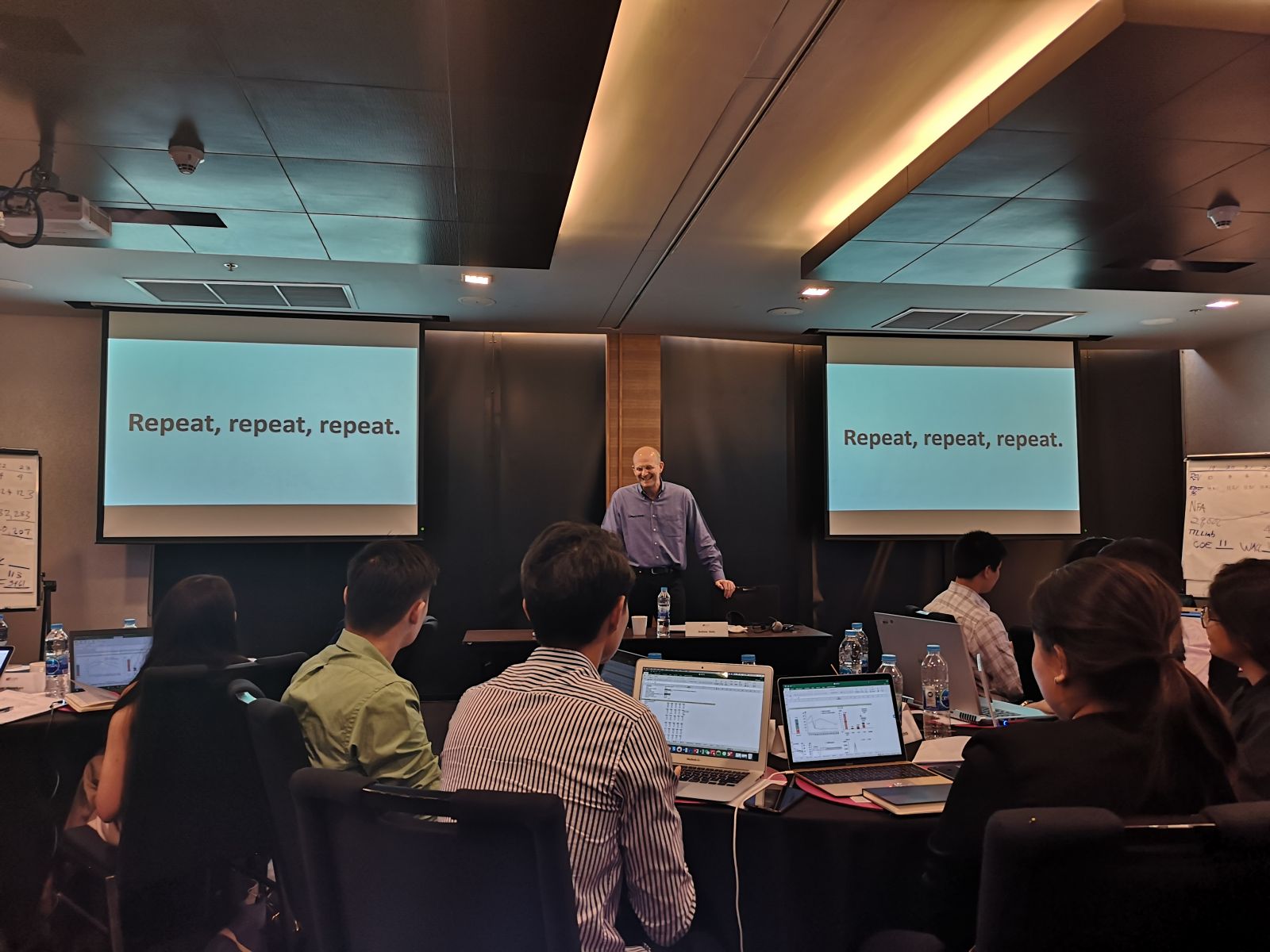
So, if any investors or entrepreneurs would like to adopt your All Weather Strategy or seek advice, can they come to you or where should they go?
Anyone can use it. They can search for my name on the internet and come to my website. I'm the only Andrew Stotz out there. If they are investing in mutual funds, they can do it through the website called FINNOMENA.com. If they go to this site, they can sign up, get an account and then they can invest. They can copy my portfolio. It's something called copycat portfolio. It will be their money, their portfolio, but they can copy what I'm doing through FINNOMENA. People who have money to invest and want help can also contact me directly. They can do that through my email. Actually, my email contact is quite easy, they can send to me@AndrewStotz.com.
Now, let’s move on to your proprietary FVMR methodology and the four elements to be considered, Fundamentals, Valuation, Momentum and Risk, when selecting a portfolio. Could you provide us with a brief explanation?
I am a structured thinker. I put things in a framework. After having been involved in investing for now 30 years, I created a framework, the FVMR, that comprises fundamentals, valuation, momentum and risk. Basically, I look at any investment from four angles. I ask: Are the fundamentals of this company strong? Is the valuation of this company cheap? What about the momentum? Here I look at whether the stock market price and company earnings are rising or falling. And last, but not least, is risk. How risky is it to invest in this company? What are the risks with the share price? So basically, I look at all of my investments these days using the FVMR framework, whether it’s my portfolios of individual stocks or asset allocation while also considering the All Weather Strategy.
Anyone can apply this methodology. If they have any questions, they can ask me. I'm happy to talk about it. The point is that my investment products, everything that I do, is based upon this methodology.
So, if a person opens a FINNOMENA account, they can create a copycat portfolio, following mine and take advantage of my experience. It's a stable and good methodology for investment, but as we know, nothing is guaranteed and this is very true when investing. It's tough. I mean I have spent my whole life, like many other fund managers and investors and analysts, but I think the big difference in my case is that I've learned that risk management is really the key. When I was young, I thought it was about being really successful, picking the stock that's going to go up, but really, it's about not losing in the downturn.
Can this methodology be applied to determine whether a person should take action on their personal investment or, for that matter, what fund managers and institutional investors will be recommending?
Basically, I provide FVMR as a tool to institutional investors who use it as a supplement to help them pick stocks or markets. I don't generally sell it to individuals, but anybody who wants to learn more, I can certainly talk to them and go through it. Anytime someone is working with me, they’ll know that I'm using this framework, and I always explain things using this framework. A person does not need to follow my framework. If anyone wants to do this on their own, they need to just figure out what are the fundamentals of the company they are considering for investment. What is the valuation of this company? What is the momentum? And what is the risk?
I have a database that I've built and maintained with a massive amount of data I’ve collected over the past 10 years, and this data includes most every company in the world listed on stock markets. From this data I can come up with a lot of conclusions and analyses that many others have not come up with because they just don't have the time to deal with this data. But look at my hairstyle. I lost all my hair because I think about data every single day!
The US Federal Reserve and other national, or central banks have been lowering their lending interest rates to try to stem the tide. The Bank of Thailand dropped their interest to 1%. They talk about loans and assistance packages; do you agree with these moves? If so, or not, why?
Basically, I am more of what would be called a libertarian or free market person. I think that the idea of government intervention in the markets leads to disaster. In fact, the current crisis was mainly caused by super low interest rates in the US. They had cut taxes, driving people to invest in the stock market and many different things. So, we had an artificially inflated market, and now through government policy, we have the opposite situation.
So now we have to figure out what to do. It's like creating a heroin addict. You give them more and more heroin and then they start to overdose. Are you going to withdraw the heroin at this point? You're probably going to have to give them more heroin so they can survive the overdose. And right now, that's exactly what's happening in the US.
The big difference, though, between Thailand and the US is Thailand's government debt to GDP is very low. The US debt to GDP is almost as high as it was after World War II. In my estimate over the next five years the US economy is going to implode even more than the Great Depression. And where did America get the money to fight World War II? Americans, like my mother, bought government war bonds. They gave the government money and they got the war bonds in exchange, and when the war was over, the government repaid the Americans.
Now, the American people don’t have the money to lend to the government. So, the government is paying them. It's a disastrous situation. Thailand is in a good position with its government debt levels. Thailand is not as vulnerable as the US right now. Where Thailand is vulnerable is in consumer credit, household credit and individual credit, which are very high relative to most countries. This is where Thailand is at risk, and the financial crunch could come, particularly if all these people are losing their jobs right now.
Then, what is the next move you would recommend for Thailand?
My advice at this point is not to destroy the Thai economy. If I was the head of the Ministry of Industry, I would be visiting different factories every single day, visiting food factories and introducing all the best ideas to prevent their staff from getting exposed to Covid-19, and I would do whatever I could to keep businesses running.
Thailand is not rich the way the US is. The US can increase its debt all day long, and it doesn't hurt the US. If Thailand follows this example, it could mean disaster. The point is we can't afford an overall economic collapse. The government needs to figure out how to support the people so that they can keep working, especially with this level of household debt that's very high. It's also important that people are working, which is vital for capitalism. Here we can see capitalism disappearing for the moment. Things could start falling apart because business is what keeps products and services flowing. So, we need to keep business running.
To conclude, could you tell us something about the Value Accelerator Program and Valuation Master Class as well as your podcasts?
The Value Accelerator Program comes from my experience as a financial analyst and owner of the coffee factory. As a financial analyst, I tried to explain financial analysis to my management team, but they really didn't understand it. As a result, I created a scorecard that I call a “World Class Benchmarking” scorecard. Remember, I told you that I have a database of every company in the world? Well, for example, I analyze the financial performance of global competitors of CoffeeWORKS, and I compare the two on a few different financial measures, and then I compare them to our global competitors. After this, I work with the management team to determine our financial weaknesses and how to improve them.
I combine teaching with coaching to help the management team understand how a company can raise itself financially to be world class. People who are interested can contact me and see how I conduct my one- and two-day training programs at companies for their management teams. After training, some companies will say they need support to implement this, and then I do a monthly scorecard update and work with the management team to make sure that they are upgrading their company to become financially world class.
Finally, about my podcast, it’s a bit strange. Normally, in the financial world, we talk about our winners, what we did to get there and how great we are. But my podcast talks about our failures. Guests talk about their Worst Investments Ever. I interview people from around the world who talk about their worst investment and what happened. They didn't go into it thinking it would be the worst investment, but eventually it became that. Then, I ask what they learned? Anybody who's interested in learning from the losses of others, should listen.



